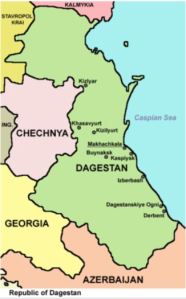Advanced Reader’s Copy courtesy of Auntie’s Bookstore
Time: 1850s. Pre-American Civil War.
Place: The indigenous highlanders in the mountains of Dagestan are all fighting against the encroachment of the Tsar’s Russian empire. Along with Chechens and Tartars. The Georgians have recently ceded their kingdom to Russian control.
A Sampling of the Main Characters:
1850s
 Anna, whose grandfather was the last King of Georgia, gets caught up in the conflict between the Russians and the Dagestanis–in particular the lead resistance fighter, Imam Shamil.
Anna, whose grandfather was the last King of Georgia, gets caught up in the conflict between the Russians and the Dagestanis–in particular the lead resistance fighter, Imam Shamil.- Jamileldin, Shamil’s son, who is given as a hostage to negotiations in Moscow as an 8-year old and raised as a Russian. Caught uncomfortably between worlds.
Modern Times
- Natasha Hussein Wilson, a half-Russian, half-Sudanese university lecturer in the UK and her friends
- Malek and her son Osama (Oz), Muslim Chechens who claim to be descended from Imam Shamil
Beg, Borrow or Steal
Get ahold of this book if you have to beg, borrow, or steal it. Author Leila Aboulela won the first Caine Prize for African Writing and I can see why. SUCH a GREAT READ!!!
Here, read for yourself:
This is Natasha speaking about her Eastern European friend Grusha and her Sudanese son Yasha:

“When I told them that I missed them, I meant it; aware now of that parallel life I coudl have led if my parents’ marriage hadn’t ended. I valued the sense of belonging they gave me, the certainty that I was not an isolated member of a species but simply one who had wandered far from the flock and still managed to survive, for better or for worse, in a different habitat.
” Chatting with them, we would skip from Russian to English to Arabic and I relaxed without the need to prove, explain or distinguish myself. Not squeeze to fit in, nor watch out of the corner of my eye the threats that my very existence could provoke in the wrong place in the wrong time among the wrong crowd.”
Themes: The Good Stuff

This book thoughtfully, and in a reasoned way, explores the themes of identity, language, borders, family, belonging, home, cultural conflict and assimilation…so many of the ideas that fascinate and obsess me.
Like the hostage Jamalaldin, my own great-grandfather forgot his birth language of Danish after being assimilated in the U.S. at the tender age of 8. Then he could no longer speak to his own grandparents, had they been able to communicate across half a world.
Since we as readers bring our own stories to the stories we read, I was also struck by the appearance of tuberculosis in the book, having just read Germs, Genes, and Civilization: How Epidemics Shaped Who We Are Today, which explains history and especially religion as a product of viruses and bacteria!

It is refreshing to read a novel in which the Muslims aren’t portrayed as fanatics–Imam Shamil was about peace and forgiveness of enemies in the end, and treating hostages as guests. He might have even defeated the Russians if the Crimean War hadn’t gotten all of the attention of Britain, France, and the Ottomans.
Note: This novel was published in the UK in 2015–not sure when US publication will be.
